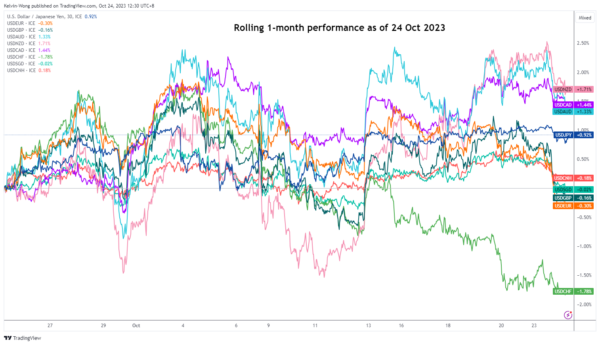- USD/JPY’s current year-to-date outperformance has started to dissipate based on a shorter-term one-month rolling basis.
- A disappointing Japan Services PMI (flash) for October has failed to ignite an intraday bullish movement in USD/JPY.
- Three main factors that are likely to be the cause; intervention risk, inter-market expectations, and momentum.
- Watch the key 20-day moving average on the USD/JPY, now acting as support at 149.30.
The major uptrend phase of the USD/JPY in place since mid-January 2023 seems to be losing its bullish inertia even though it has recorded a year-to-date gain of +14.16% as of 24 October at this time of the writing, the best US dollar major pair ahead of the USD/CAD (+0.72%), USD/EUR (-0.15%), USDGBP (-1.78%), and USD/CHF (-3.78%).
On a shorter horizon based on the one-month rolling performances of the major US dollar pairs as of 24 October 2023, the bullish momentum of the USD/JPY has started to dissipate from a peak of +1.16% to a current gain of +0.90% (see figure 1).

Fig 1: US dollar major pairs rolling 1-month performances as of 24 Oct 2023 (Source: TradingView, click to enlarge chart)
A disappointing Services PMI has failed to ignite a rally in USD/JPY
Also, today’s weak Japan’s flash Services PMI print for October came in below expectations (51.1 versus 52.9 forecasted & 53.8 in September) where the growth in the services sector slowed to a ten-month low has failed to ignite a short-term intraday bullish movement in the USD/JPY.
In the past, disappointing key economic data in Japan tended to lead to a bid in USD/JPY as market participants upped the expectations of the Bank of Japan (BoJ) to delay monetary policy normalization away from short-term negative interest rates which in turn maintained the policy divergence status quo between the BoJ and US Federal Reserve as well as the rest of the world’s central banks that have pivoted away from either zero or negative interest rates since 2022.
What is causing the lack of bullish enthusiasm in USD/JPY?
There are three possible factors; intervention risk from policymakers, inter-market expectations, and momentum.
Firstly, verbal interventions in the past two months by Japan’s Ministry of Finance (MoF) officials have been drummed up as the JPY weakened considerably against the US dollar due to robust key US economic data that increased the odds of the Fed’s current stance of keeping US interest rates at a higher level for a longer period.
Also, MoF’s verbal intervention is likely to have morphed into a recent real intervention in the foreign exchange market to halt the pace of JPY weakness on 3 October where the USD/JPY printed an intraday high of 150.
